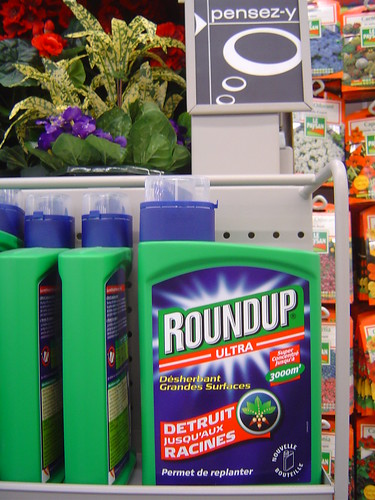 |
| Photo from David_Reverchon on Flickr |
More than four decades after the
herbicide, glyphosate, first entered our food chain and nearly two
decades after this chemical started to increase dramatically in our
diet due to its accumulation in 'Roundup Ready' GM crops, scientists
have taken a look at what glyphosate might be doing to our insides.
The indications are not good.
The gut is one of the most complex
organ system in our bodies. Not only must it move food, add
digestive juices, exclude and eliminate toxins, absorb nutrients and
send messages to the rest of the body about what's coming, but it
depends on a colossal collection of microbial organisms living inside
it to perform its functions and to protect health.
'Normal' gut microbes vary according to
the diet, the season, the species of animal and according to their
exact location in the gut. Only about 1% of these organisms have
been identified and studied, but those few that have demonstrate that
the gut has its own highly complex ecology in which some bugs support
and some bugs suppress the growth of others. In health, animals have
'good' bugs which prevent the 'bad' bugs from colonising their
digestive system and making them ill.
Enter glyphosate mixed in with food and
feed.
Using chickens as a model, scientists
investigated what effect glyphosate has on five beneficial bacteria
and five highly pathogenic bacteria. They found that the 'good' bugs
were very easily killed by the herbicide, while the 'bad' bugs tended
to be resistant. This suggests that the presence of glyphosate in
the diet has serious implications: it means that the microbes which
normally suppress the pathogenic ones are being killed while the
disease-causing ones are left free to multiply.
It was noted that the concentrations at
which harm from glyphosate began to be evident in 'good' bugs was not
much higher than the maximum residue levels set by regulators
(normally, the permitted levels are one-hundredth of the highest
concentration of a toxin for which harm has not
been demonstrated). As the authors point out
“... data on the real presence of glyphsate and its metabolite AMPA (also toxic) in feed from glyphosate sprayed crops are sparse. Glyphosate residue differs from country to country (in some countries glyphosate is sprayed out of control) and even within a country, depending on the quantity and frequency of glyphosate application.”
In other words,
no one knows how much glyphosate is actually in food and feed: as the
use of this herbicide escalates on GM crops due to the emergence of
Roundup-resistant weeds, residue levels must also be escalating.
Besides altering the healthy balance of
the gut ecosystem, glyphosate is known to complex with metal ions
(calcium, magnesium, iron, manganese, zinc, copper). This makes
these essential trace nutrients unavailable to the organisms around
them. Since metal ions are important for the function of enzymes and
the immune system in all life-forms, deficiency caused by
glyphosate binding to them can have serious consequences for health.
The findings of this study on chicken
gut microbes has huge implications for human health. On the one
hand, it describes the mechanism by which food-borne diseases can
arise from livestock, the root cause of the need for excessive
anti-biotic use in farmed animals, and the possibility of nutritional
deficiencies in the animals which enter our food chain. Secondly, it
provides a model for events in the human gut exposed to glyphosate,
and spells out how our health could suffer directly.
As if this isn't bad enough, another
piece of research published earlier in 2012 noted that in three
microbes used in dairy-food fermentation (e.g. cheese-making),
Roundup was damaging at concentrations below those used in
agricultural application. Glyphosate alone, however, was not harmful
to these organisms. Indeed other studies have established that
Roundup can be 100 times more toxic to certain microbes than its
active ingredient. Livestock consuming Roundup might have even
bigger problems with digestive system health than is apparent from
experiments on glyphosate in isolation. (Note that a loss of
microbial diversity and concentration in milk has been observed in
raw milk for many years.)
There are many routes by which
glyphosate and Roundup can reach the human gut: ground-water and
waterways in sprayed areas are frequently contaminated, many non-GM
crops are routinely sprayed with Roundup before harvesting and spray
drift can land on adjacent crops, and of course Roundup Ready GM
crops accumulate the herbicide.
OUR COMMENT
Just for the record, Monsanto's view is
“Roundup has one of the most extensive human health safety and
environmental data packages of any pesticide that's our there ...
There's been a great deal of study on Roundup, and we're very proud
of its performance”, while the US Environmental Protection Agency's
view is that “Risk estimates for glyphosate were well below the
level of concern”. Based on the above science, you could give them
an argument: whatever was investigated to produce the “human health
safety data package”, the “great deal of study on Roundup” and
“Risk estimates for glyphosate”, it should certainly include what these
chemicals do inside you.
The contents of the digestive tract
have an unimaginable complexity: trillions of microbes interacting
with each other, with the diet, with toxins present in food or
arising from the body, and with DNA released into the gut. Change
one thing and all the rest change.
If we can't use all this as a reason to
eat natural, organic food, then we deserve to get sick.
SOURCES:
- Awad A. Shehata et al., 2012, The Effect of Glyphosate on Potential Pathogens and Beneficial Members of Poultry Microbiota In Vitro, Current Microbiology, 9.12.12
- Emilie Clair et al., 2012, Effects of Roundup and Glyphosate on Three Food Microorganisms Geotrichum candidum, Lactococcus lactis subsp. cremoris and Lactobacills delbrueckii subsp. bulgaricus, Current Microbiology, 24.02.12
- Crystal Gammon, Weed-Whacking Herbicide Proves Deadly to Human Cells, Scientific American, 23.06.09
No comments:
Post a Comment
Thanks for your comment. All comments are moderated before they are published.